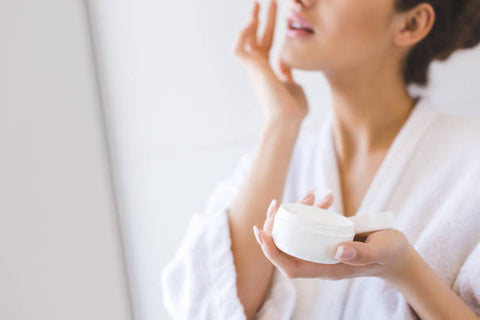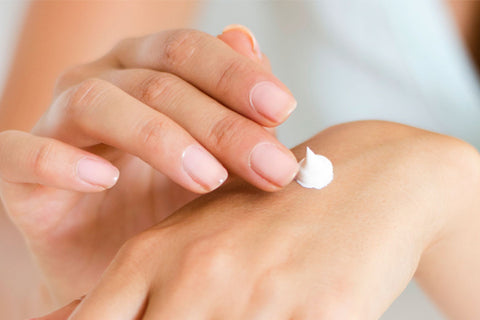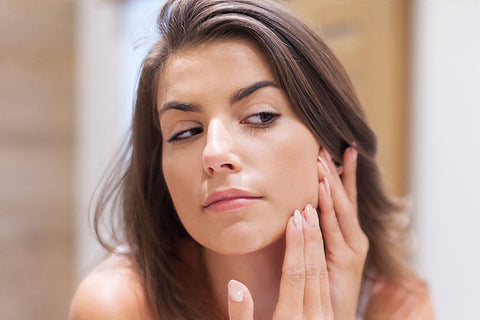At this point, you have probably heard that retinol should be part of everyone’s anti-aging regimen. But do you really know what it is, how it works, and how old you should be to start using it? Like most people, your answer is probably: Ummm…. Sort of… no. So let’s get some #realtalk going on the risks and benefits of retinol, and why you should be on one.
What is Retinol?
Retinol is a Vitamin A derivative that falls under the wider category of retinoids. It was approved in the 1970s for use in acne patients. When applied to the skin, it promotes cell turnover and prevents the clogging of pores, which not only defends against blemishes but helps all of your other skincare products to penetrate and work better.
Retinol contains variety of benefits for the skin and help:- Refine skin texture and tone
How Does Retinol Work?
Retinol works on many levels and in a variety of ways. Retinol promotes cell turnover by causing skin cells to turn over and shed, revealing the healthy skin underneath. By increasing the renewal rate of cells, pores are able to stay clear which then prevents acne. Cell turnover also helps to even skin tone by diminishing and preventing hyperpigmentation, otherwise known as dark spots.
One of the benefits of retinol is that it increases collagen production. The body naturally produces an abundance of collagen, which promotes youthful and plump skin. That being said, collagen production begins to decline around the age of 25- yikes! Retinol skincare helps to promote collagen production in the body which is proven to promote skin elasticity while reversing aging by decreasing fine lines and wrinkles.
Prescription vs Over-the-Counter Options
Retinoids come in a variety of forms and options. It can be applied topically or taken orally and comes in multiple strengths. Topical retinoid treatments can be found in different forms ranging from alcohol-based gels to cream-based lotions.
There are three types of retinoids that are available over-the-counter and are listed in order of increasing strength: Retinyl palmitate, Retinaldehyde, and Retinol. The two types of retinoids that are by prescription only are Tretinoin (Retin-A) and Tazarotene. Tazarotene is the most powerful form of retinoid.
Retinol is the strongest ingredient found in over-the-counter retinoid products and comes in a variety of strengths, ranging from 0.25% to 1%. Higher strengths of retinol are only available by prescription. Over-the-counter treatments are more gentle compared to prescription forms of retinoids, which show fast results but may increase the likelihood of experiencing side effects.
How Long Does it Take for Retinol to Work?
The visible effects of retinol will depend on the strength of the chosen product and vary from person to person. It is recommended to ease your way into using retinol as it may be initially harsh for your skin and cause irritation or redness. Most people notice that redness and irritation cause their skin to look worse before it gets better.
Retinol is known to deliver results in as little as four weeks, but on average it takes about twelve weeks to notice visible changes in skin texture and tone. A small percentage of people may have a difficult time building a tolerance to their retinol product. If you have sensitive or dry skin, it is recommended that you use a lower strength retinol product and start with only using it a few days per week. Slowly you can build up to using it every night.
Why is Retinol in Sunscreen & SPF Products?
Retinol can be found in some sunscreen and SPF products. However, retinol is more commonly found in a skin moisturizers, skincare serum, or cream. Talk to your doctor before using sunscreen containing retinol in conjunction with a retinol topical as it may further irritate the skin.
Sunscreen or an SPF tinted moisturizer should be applied daily as retinol products may cause sun sensitivity. As a result, It is recommended that retinol be applied at night as sunlight also deactivates retinoic acid.
The Role of Vitamin A
Retinol is a Vitamin A derivative that promotes cell turnover and increases collagen production resulting in healthier, more youthful-looking skin. Vitamin A is proven to promote immune function and support skin, eye, and reproductive health.
Vitamin A can be found naturally in a variety of foods such as eggs, salmon, cod liver oil, orange and yellow vegetables and fruits, and dark and leafy vegetables. Vitamin A can also be found in topical products and vitamin supplements.
Consuming too much Vitamin A can produce unwanted side effects, such as headaches, nausea, dizziness, and liver damage. It is recommended to use a retinol product if the goal is to promote healthy skin.
Retinol Cream Side Effects
Retinol is one of the most highly researched and recommended skincare ingredients by medical professionals. Although retinol provides a plethora of benefits for the skin, there are some side effects of using retinol that should be discussed.
Side effects of using retinol may include:
- Redness
- Irritation
- Burning
- Itching
- Dry skin
- Flaking and peeling of the skin
- Increased sensitivity to the sun
- Skin cancer
Is Retinol Safe?
Although there are risks associated with the use of retinol, it is deemed safe to use and is not bad for you. Retinoid products are strongly recommended by doctors because it is highly researched and show many benefits. Some people may experience a negative reaction to retinol within the first couple weeks of usage due to the concentration being too high for their skin.
Retinization is a process that increases the side effects of retinol such as redness and irritation. It is important to slowly and gradually increase the amount of product used in order to allow the skin to get used to the product. It may take a few weeks of usage before the benefits are visible.
Are There Any Long Term Retinol Side Effects?
Long-term side effects of retinol are highly unlikely. However, retinol must be used responsibly as it does make the skin more sun-sensitive and the likelihood of becoming sunburned is higher if SPF and physical blocks like hats are not used. Sunburns are associated with skin cancer but this is not a direct link between retinol and cancer at all.
It is important to note that these situations are highly unlikely and there is no research stating that retinol is not safe for long term use.
Here are some of our favourite retinol products
Revision Skincare Retinol Complete 0.5
Revision Skincare Retinol Complete 1.0
Sente Intensive Bio Complete Cream
Alastin Skincare Renewal Retinol .5
Alastin Skincare Renewal Retinol .25
SkinMedica Retinol Complex 0.5
Frequently Asked Questions:
Is Retinol Safe for Skin?
Yes, retinol is safe for skin. It is one of the most recommended ingredients to counteract aging skin. Retinol may cause minor side effects such as redness and irritation. However, these side effects dissipate within a few weeks as the skin becomes used to the cell turnover rate.
Is Retinol Safe for Sensitive Skin?
Retinol is safe for sensitive skin. It is recommended that people with sensitive or dry skin begin with a lower dosage of retinol, such as 0.25%, before working your way up. If you are just starting to use retinol, begin by applying a small amount of retinol 2-3 times a week to allow tolerance to build.
Is Retinol Safe for Black Skin?
Retinol is safe for all skin colors. Retinol can help assist dark spots and hyperpigmentation in both dark and light skin colors. It is important to start off with a lower dosage of retinol to allow the skin to become used to the cell turnover rate.
Is Retinol Safe for Under Eyes?
It is a common misconception that retinol is not safe for around the eyes as the skin is thin. In fact, retinol should be placed around the eyes as this is where most of the damage shows up. NazarianSkin Smooth Eye is an excellent eye cream with retinol.
Is Retinol Safe for Wrinkles?
Retinol is not only safe but helps diminish wrinkles and fine lines whilst preventing future lines to show. Retinol promotes collagen production which helps skin look plump and youthful.
Is Retinol Safe for Long Term Use?
There is no research that states retinol is not safe for long term use. Retinol can be used indefinitely to combat signs of aging.
How Can I Avoid the Side Effects of Retinol?
Retinol gets a bad rap because of its side effects like redness, peeling, and irritation. A bit of education goes a long way in helping curb retinol side effects and getting your skin used to the product. Retinol should be applied 2-3 nights per week to start. If the skin isn’t irritated by it, move up to 4 nights a week. Personally, I have very sensitive skin and it took me 7 months to work up to using it every night. Also, you want to start with a retinol 0.25 or 0.5 and definitely not a Retin-A product which is stronger than retinol.
What are Other Products I Should be Using to Avoid Retinol Side Effects?
Retinol makes your skin more sun-sensitive so you want to make sure you are using at least an SPF 30 and reapplying throughout the day with Colorescience SPF that comes in a brush/powder and soaks up oils and doesn’t mess up your makeup.
Does Retinol Cause Thinning of the Skin?
Some of my Instagram followers expressed concern, saying that retinol thins the skin. This is partially true but mostly untrue. Retinol causes cell turnover and thins the epidermis in the first few months of use (like a peel) but then starts to thicken the deeper layers of skin, ultimately leading to thicker skin – what we all want! Thicker skin doesn’t show fine lines and wrinkles which is why retinol is such a benefit to most people.
Should I Use Prescription Retinol or an Over-the-Counter Retinol?
My answer to this is it depends on what you are treating. If you are treating acne, retinol is often combined with other proven ingredients like benzoyl peroxide and is at a higher dose when it is prescription. But there is no harm in using an over-the-counter brand as long as it has been studied! Just because it says retinol on the bottle doesn’t mean stringent testing has been done to make sure the ingredients remain active after they have been packaged. Sometimes, an ingredient can be deemed inactive when coming into contact with the packaging they are put in. Products on our website, theskinspot.com, have been vetted for efficacy… so many products are on the market, you want to make sure the one you are putting on your face and body actually does what it claims it will do.
How do I Know if the Retinol I am Purchasing Online is Not Fake?
Going to go off on a tangent for a second… many medical-grade products found on online stores like eBay or Amazon are counterfeit or expired. Most medical-grade brands do not allow online sales or will only allow doctors to retail their products. When you purchase from theskinspot.com, you know you are getting the real deal.
Is Retinol Safe for Pregnant or Breastfeeding Women?
Let’s get to the question at hand: who should be and who shouldn’t be using retinol? The first group to address are pregnant or breastfeeding women. While your doctor will likely advise against the use of retinol during pregnancy, it's important to explore Pregnancy Safe Skincare alternatives. Most OB/GYN doctors I know will continue to use it throughout their pregnancies and while they are breastfeeding, suggesting that the amount of retinol entering the bloodstream is negligible. However, due to the litigious environment in which doctors practice, it is rare for a medical professional to officially endorse its use during these sensitive times.
Can Retinol Cause Issues With Your Liver?
The second myth I would like to address is retinol side effects on the liver. While large doses of Vitamin A can have effects on the liver, retinol doses in the bloodstream are so low that the liver is not affected by this topical application. On the other hand, high doses of Vitamin A, like in Accutane treatment, can affect the liver and testing liver enzyme levels is recommended. But keep in mind, Accutane is a whole other level of Vitamin A than topical retinol.
Can Rosacea Patients Use Retinol?
Absolutely! Rosacea patients should not put the anti-aging benefits of retinol to the side just because they have more sensitive skin. In fact, acne rosacea patients can truly benefit as it will help with their acne as well. The product we recommend to these patients is Sente Bio Complete Serum, a hydrating retinoid made specifically for sensitive skin.
Can Kids or Teenagers Use Retinol?
I will tell you that my daughter began breaking out at 10 years old and seeing acne-scarred patients in my practice on a daily basis, I am of the opinion that prevention is best. I started her on a gentle cleanser like Alastin Skincare Gentle Cleanser, a Clarisonic, Vitamin C, a tinted sunscreen like Alastin Skincare HydraTint Pro Mineral Broad Spectrum Sunscreen SPF 36 (makes her feel like she is wearing makeup so she actually loves using it!), and YES, a retinol 0.5% like Alastin Skincare Renewal Retinol .5 a few nights a week to keep her acne at bay. So there you have it! There are different types of retinol that are best for each type of patient, so make sure to take our skin quiz on The Skin Spot to see which regimen is right for you.
Here is Why You Should Not be Concerned About the Perceived Dangers of Using Topical Retinol
Retinol is an ingredient that is highly recommended by doctors to incorporate into your skincare routine. However, there are many misconceptions about the perceived dangers and side effects of retinol. Retinol is commonly researched and shows that the benefits it has to outweigh the negatives. The side effects of retinol are minor and disappear within the first few weeks and retinol is deemed safe by health professionals.
It is important to do your research in order to know the strength of retinol you should be using for your skin type. Taking precautions by starting with a lower strength retinol product or conducting a spot test will help to ensure the best results for your skin.




10 comments
Thanks for sharing your wonderful posts 👍. You are doing great work! I just want to share my success story. Hope this helps. I’ve been using Retin-A (Tretinoin). No side effects at all. Very happy 😊 I found ‘ QACNE365 ’ in google and got retin-a ❤️. It is hands down the most effective anti-acne, anti-dark spot, anti-whatever skin flaw you may have. It is the only thing that has actually helped with my acne. People comment on my skin daily.
Hi,
I believe my skin irritation is from Retinol use, not roseca as originally thought. It has started since I started using it and I have all the symptons explained.
I believe through my own fault of using it. I went from nothing to sometimes twice a day. I didn’t really know what I was applying. Someone gave it to me as a present and said how great it was, so I just started using it where my skin was dry every day having washed my face.
In a panic with all these spots and dry skin and red cheeks coming up, I stopped using it, thinking it was that as the cause, then thinking it was roseca and now on antibiotics, but actually am now convinced it is the retinol use.
I believe the sudden stop can’t have helped either and it has got so bad! Burns like mad, white heads, particularly every morning, flaking skin and redness. Incredibly unattractive!
Do you have a recommendation of what to do? Should I start re-applying a little now to help the skin, or leave to let it recover?
Appreciate your advice in advance.
Amelia
Retinol is a great ingredient to use on your skin. It does a great job of eliminating fine lines and wrinkles. I have always had a difficult time with fine lines on my face, so I tried out retinol at a young age. It has worked for me all of these years. I recommend it to everyone wanting to keep their skin from aging. This may not be the solution for you, but there are lots of other ingredients out there that may work for your skin. I suggest doing some research and talk with your doctor to learn about all your choices.
Acne is every girl’s nightmare, including mine. I was so insecure about my acne, that I even talked to my doctor about it. He recommended trying out a product containing retinol. I started doing some research to find out more about retinol. I found that it’s not only good for acne but also diminishes wrinkles. I decided to purchase a cleanser with retinol, and I use it daily. I have been using it for 6 weeks and my face looks so much better. I recommend all products with retinol to anyone with acne. If this ingredient doesn’t work with your skin, then I recommend doing some research to find other products for you. There are lots of options out there to try!